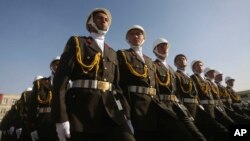In yet another sign of a continued thaw in bilateral security cooperation, Afghanistan has sent a group of six Afghan army cadets to neighboring Pakistan for military training.
The group of young Afghan cadets will attend an 18-month course at the Pakistan Military Academy in the northern city of Abbottabad. Though small, it is the first ever induction of security personnel from Afghanistan at the prestigious army institution.
Officials in both countries are hailing the move as an important step toward linking the two armies, which have been suspicious of each other for decades.
Pakistani foreign ministry spokeswoman Tasnim Aslam says the arrival of Afghan cadets underscores increasing cooperation with Afghanistan.
“It is a very positive development," she said. "This is one more manifestation of the very constructive and expanding engagement between Pakistan and Afghanistan. We have also seen greater cooperation and understanding between security agencies.”
In a written statement, Afghanistan’s ambassador to Pakistan, Janan Mosazai, said he hopes the move will boost efforts to strengthen, broaden and deepen security and particularly military-to-military relations.
Under former president Hamid Karzai, Afghanistan had turned down repeated Pakistani offers for training Afghan personnel. Karzai often publicly condemned Pakistan’s military and its spy agency for supporting and training the Taliban insurgency in Afghanistan, charges Islamabad denied.
The former Afghan leader, however, went ahead and signed a security agreement with Pakistan’s archrival, India, a move that further strained ties. Several thousand Afghan personnel are said to have received military training in India over the past years.
However, the government of Pakistan insists it is now strictly adhering to a policy of non-interference in the neighboring country’s affairs and its military is conducting offensives to deny sanctuaries to Afghan and other insurgents in border regions. Head of Islamabad’s privately-run Jinnah Institute, Sherry Rehman, says Pakistan’s neutral policy is key to its own stability.
“What it means that there is not going to be no favorites [in Afghanistan] to play for Islamabad," said Rehman. "Moving away from that [policy] has already yielded clear dividends in the response from Kabul and we hope that remains consistent. It is incumbent on us to support what Kabul seeks in terms of roadmap for peace.”
Officials in both countries link the growing security cooperation to November’s successful visit by new Afghan President Ashraf Ghani to Islamabad, where he emphasized the need for opening “a new chapter” in bilateral relations and promised not to allow anti-Pakistan militants to use Afghan territory for subversive acts.
The countries have since exchanged high-level military delegations in their joint bid to enhance cooperation against Islamic militants, which both countries consider detrimental to internal stability.
Kabul says its forces have killed scores of militants in response to Islamabad's complaints that fugitive Pakistani militants are sheltering in border areas of Afghanistan, from where they plot terrorist raids inside Pakistan.
